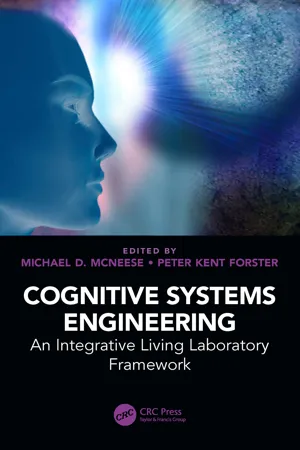
eBook - ePub
Cognitive Systems Engineering
An Integrative Living Laboratory Framework
- 392 pages
- English
- ePUB (mobile friendly)
- Available on iOS & Android
eBook - ePub
Cognitive Systems Engineering
An Integrative Living Laboratory Framework
About this book
This book provides a framework for integrating complex systems that are problem-centric, human-centered, and provides an interdisciplinary, multi-methodological purview of multiple perspectives surrounding the human factors/human actors within living ecosystems. This book will provide useful theoretical and practical information to human factors, human-computer interaction, cognitive systems engineering personnel who are currently engaged in human-centered design or other applied aspects of modeling, simulation, and design that requires joint understanding of theory and practice.
Tools to learn more effectively

Saving Books

Keyword Search

Annotating Text

Listen to it instead
Information
Subject Index
Note: Page numbers followed by f and t refer to figures and tables, respectively
A
Active errors, 323
ACT-R, 224–227, 224f
conflict-resolution cycle, 225–226, 225f
memory systems, 224
perceptual-motor modules, 224
subsymbolic activation value, 226
Adaptable interface, 187
Adaptive Architectures for Command and Control (A2C2), 172
Adaptive team model, 166
Advanced Interface Design Lab (AIDL) simulator, 269–273
display panels, 269
interface design of, 269
interface layout, 270f
interruption, 272–273
predictability, 269, 272
task load, 272
volatility, 269
Advanced knowledge and design acquisition methods (AKADAM), 8–9, 304–305
Agile development, living laboratory and, 333–338, 335f
principles, 334
software development, 336–337
sprint, 336–338
success criteria, 337
user feedback evaluation, 338
AIDL simulator. See Advanced Interface Design Lab (AIDL) simulator
Air Force Research Laboratory (AFRL), 4
Analog storytelling, 190, 192
Analyses of variance (ANOVA’s), 322
Analysis, CTA, 118
Artificial-intelligence (AI) approach, 200
Attention processes, 6
B
Backseat driving approach, 69
Beta activity, 231
Big data, 328
Black box, 25
Blood oxygen level dependent (BOLD), 231
Boston Marathon bombing, 141, 368
Building cognitive systems, 133
C
Canvas LMS, Federated Wiki, 68, 77
Card-sorting, 115–116, 349–350
Catastrophic events, 133
CCRINGSS program, 82–85
Character, WoW, 279t
Chat panel, NeoCITIES interface, 245
CIS. See Collaborative information seeking ...
Table of contents
- Cover
- Half Title
- Title Page
- Copyright Page
- Dedication
- Table of Contents
- Preface
- About the Editors
- Contributors
- SECTION I Introduction and Historical Precedence
- SECTION II The Living Laboratory: Learning in Action
- SECTION III Theoretical Perspectives in Cognitive–Collaborative Systems
- SECTION IV Models and Measures of Cognitive Work
- SECTION V Scaled-World Simulations
- SECTION VI Knowledge Capture, Design, integration, and Practice
- SECTION VII The Future of the Living Laboratory
- Author Index
- Subject Index
Frequently asked questions
Yes, you can cancel anytime from the Subscription tab in your account settings on the Perlego website. Your subscription will stay active until the end of your current billing period. Learn how to cancel your subscription
No, books cannot be downloaded as external files, such as PDFs, for use outside of Perlego. However, you can download books within the Perlego app for offline reading on mobile or tablet. Learn how to download books offline
Perlego offers two plans: Essential and Complete
- Essential is ideal for learners and professionals who enjoy exploring a wide range of subjects. Access the Essential Library with 800,000+ trusted titles and best-sellers across business, personal growth, and the humanities. Includes unlimited reading time and Standard Read Aloud voice.
- Complete: Perfect for advanced learners and researchers needing full, unrestricted access. Unlock 1.4M+ books across hundreds of subjects, including academic and specialized titles. The Complete Plan also includes advanced features like Premium Read Aloud and Research Assistant.
We are an online textbook subscription service, where you can get access to an entire online library for less than the price of a single book per month. With over 1 million books across 990+ topics, we’ve got you covered! Learn about our mission
Look out for the read-aloud symbol on your next book to see if you can listen to it. The read-aloud tool reads text aloud for you, highlighting the text as it is being read. You can pause it, speed it up and slow it down. Learn more about Read Aloud
Yes! You can use the Perlego app on both iOS and Android devices to read anytime, anywhere — even offline. Perfect for commutes or when you’re on the go.
Please note we cannot support devices running on iOS 13 and Android 7 or earlier. Learn more about using the app
Please note we cannot support devices running on iOS 13 and Android 7 or earlier. Learn more about using the app
Yes, you can access Cognitive Systems Engineering by Michael D. McNeese,Peter Kent Forster in PDF and/or ePUB format, as well as other popular books in Computer Science & Software Development. We have over one million books available in our catalogue for you to explore.